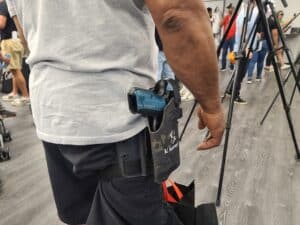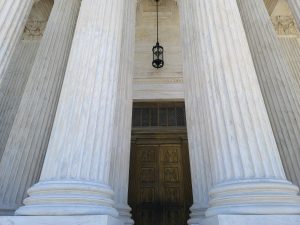The Empire State believes its gun-carry restrictions are similar to racist gun bans from the past, and that’s why they should be upheld.
New York cited historical bans on gun ownership by Native Americans and Catholics to support its current concealed-carry permitting law. The state argued in a Monday filing its “good moral character” clause, which allows officials to deny permits to those they don’t feel are good people, is rooted in the historical tradition of “Anglo-American” gun regulations. It first pointed to several colonial gun bans as analogous to its own law.
“From the early days of English settlement in America, the colonies sought to prevent Native American tribes from acquiring firearms, passing laws forbidding the sale and trading of arms to Indigenous people,” the filing from the office of Attorney General Letitia James (D.) reads.
New York then cited historical laws in England and America denying people their gun rights based on religion as another example of the tradition its requirement is based in.
“[E]ven after the English Bill of Rights established a right of the people to arm themselves, the right was only given to Protestants, based on a continued belief that Catholics were likely to engage in conduct that would harm themselves or others and upset the peace,” the filing said.
The arguments come in an effort to save the subjective standard for issuing permits after the Supreme Court struck down the state’s similarly subjective “good reason” clause earlier this year in New York State Rifle and Pistol Association v. Bruen. That case also established a new standard for reviewing Second Amendment cases that involves proving regulations are rooted in tradition from the time of the founding.
New York resorting to examples of openly racist or bigoted laws as analogs indicates they may have a difficult time convincing courts it is constitutional. That’s especially true if the case makes its way back up to the Supreme Court, where five of the nine justices themselves are Catholic.
Additionally, the Supreme Court has written at length about the racist history of gun-control laws in the United States. In both Bruen and McDonald v. Chicago, the Court argued race-based bans were an affront to, and evidence of, the fundamental nature of the right to keep and bear arms.
New York’s filing acknowledges the bigoted nature of the laws they cite as similar to their own. However, it argued that the laws show a tradition of subjectively denying the right to bear arms.
“A clear-eyed look at American history and doctrine will necessarily reveal episodes that are shameful but nonetheless relevant, as the Bruen opinion teaches us,” the filing said in a footnote. “Of course, if a modern instance were to arise where gun licensing requirements were applied in a discriminatory manner, it could, should, and would be struck down as unconstitutional.”
But the Court explicitly rejected Chicago’s argument in Mcdonald that racist antebellum gun bans were an indication severe restrictions could be legal if decoupled from their discriminatory factors.
“[W]hile §1 of the Fourteenth Amendment contains ‘an antidiscrimination rule,’ namely, the Equal Protection Clause, municipal respondents can hardly mean that §1 does no more than prohibit discrimination,” the Court wrote in the case. “If that were so, then the First Amendment, as applied to the States, would not prohibit nondiscriminatory abridgments of the rights to freedom of speech or freedom of religion; the Fourth Amendment, as applied to the States, would not prohibit all unreasonable searches and seizures but only discriminatory searches and seizures—and so on. We assume that this is not municipal respondents’ view, so what they must mean is that the Second Amendment should be singled out for special—and specially unfavorable—treatment. We reject that suggestion.”
The Court further argued the reaction to racist restrictions on the ownership and carry of guns by African-Americans, the so-called “Black codes,” were indications that Second Amendment protections were understood to be fundamental to basic human rights.
“[M]unicipal respondents’ argument ignores the clear terms of the Freedmen’s Bureau Act of 1866, which acknowledged the existence of the right to bear arms,” the Court wrote. “If that law had used language such as ‘the equal benefit of laws concerning the bearing of arms,’ it would be possible to interpret it as simply a prohibition of racial discrimination. But §14 speaks of and protects ‘the constitutional right to bear arms,’ an unmistakable reference to the right protected by the Second Amendment. And it protects the ‘full and equal benefit’ of this right in the States. It would have been nonsensical for Congress to guarantee the full and equal benefit of a constitutional right that does not exist.”
New York’s filing identified a few other laws it said were similar to the “good moral character” clause it hopes to preserve. It cited some militia regulations from the 17th and 18th centuries, which empowered government officials to disarm people they believed posed a threat to the community. It also cited statutes that allowed people to be disarmed after being involved in a rebellion or insurrection against the United States unless or until they swore an oath of loyalty.
“In the Revolutionary era, colonies frequently disarmed individuals based on their reputation for being disloyal or hostile to the new American nation,” the filing said.
Overall, New York’s filing seeks to convince the Court the Second Amendment’s history provides a wide birth for gun regulations, even those based solely on the description of state officials. The state argues there is precedent for all sorts of restrictions to be found in the historical record.
“1) colonial laws providing for disarmament of dissident or hostile groups,” the state filing said. “2) Revolutionary laws individually disarming persons’ disaffected to the cause of America,’ 3) militia mustering statutes providing for disarmament if a person was deemed unfit at inspection, and 4) Reconstruction-era and later licensing requirements like New York City’s that involved an individualized assessment of dangerousness – is ‘relevantly similar’ to the good moral character assessment under the CCIA, and therefore satisfies the Bruen standard.”
The case is just one of many filed in the aftermath of the Bruen decision, which served as a catalyst for New York lawmakers to pay a myriad of new gun restrictions that seemingly fly in the face of the ruling. How the case turns out will likely provide a good barometer for how well the other new restrictions fair in federal court.







3 Responses
Wow, so disloyalty to the New York Democratic regime would allow them to disarm all Republicans….no surprise there.
And make sure you’re the right color of skin and right faithful creed and right non-biased speech with good social-credit score associating with these state-approved persons and orgs and….Are these sophists going to keep searching each time for an infringement from our historical tradition of laws and lawfare?
I still hearken to Jake Fogelman’s framing, from states going from “may issue” to “shall issue-may carry”; I still chuckle at this revelation that Aunty Anti is too clever by half.
The good people of New York need to stop this baloney-making, because the sophists will just continue. “Shall Issue-May Carry” will morph into “Shall Issue-Shall Carry-May Unholster When Perceiving Deadly Threat” creeping nonsense.
Thank you. I did chuckle, but now after posting a reply to Cody’s comment I’m not chuckling any more. Again thank you, especially for continuing to talk about the State’s continuing efforts at subjective standards among other topics. The call to respond to Aunty Anti is to be like Socrates to sophists, and you help us with that task.